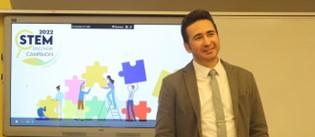
STEM stands together, Turkey: Winner of Innovative Teaching and Learning Award 2022
The Universal Language of STEM
Computer scientist Dr. Selçuk Yusuf Arslan has been chosen as Turkey’s Extraordinary Teacher of the Year three times and was a finalist in the Global Teacher Prize, but he came within a hair’s breadth of quitting teaching at the start of his career.
“My students would constantly talk during class and be disobedient, so it was a difficult time for me, and I wasn’t sure I wanted to continue,” Arslan says. “But in Turkey, on the 24th November, we have a Teacher Celebration Day, and the class leader chose that moment to stand up and say that he wanted to apologize on behalf of the whole class for their bad behaviour. The students then presented me with a big bunch of flowers. I admit my eyes grew damp, and that day I decided to dedicate myself to teaching.”
16 years later Arslan is still working at Ankara’s Ataturk vocational and technical (VET) high school and says he could never change his work “because it is so important for me.” Part of what makes it important is his pioneering work in linking science, or hard skills, with sustainability issues and soft skills. “I want my students to grow in their commitment to global citizenship, and demonstrate empathy, responsibility, team working, creativity, and problem-solving,” he says. “Education is a very powerful tool to achieve this.”
Arslan’s VET students often arrive with a low academic level, and over 50 are refugees from Syria, Iraq, and Afghanistan, which means additional challenges. “But they can certainly be successful,” he says. “On the first day of a new year I try to talk with each student and get to know what they like most, and I suggest that whatever their interest, they can achieve their goals.”
Entering national and international competitions is a key part of Arslan’s pedagogy. “Every year we enter between five and 10 awards, for example, on how to integrate computer coding with sustainability. In one class students calculated their carbon footprint through coding, and afterwards I noted how students sought alternatives to plastic, and travelled on public transport and bikes to get to school.”
In a robotics class last year Arslan’s students also raised their environmental awareness by developing a sensor, which they put in the sea to measure humidity, temperature and water pollution, and then presented their results to the appropriate authorities.
Micro:bit training
But it is in Arslan’s use of science, technology, engineering and mathematics (STEM) classes to break down barriers where he has most recently made his mark. “Due to language and cultural differences many of our migrant students do not connect with their Turkish counterparts, so I developed a workshop called “STEM Stands Together” for 16 students to develop their relationships through STEM. I formed groups of ‘one Turkish student, one refugee’ and started with an icebreaker so they got to know names and a bit about each other.”
Specifically, Arslan asked students to learn about mathematical angles through internet research, and then gave a class on the BBC Micro:bit, which is a micro-controller that can be programmed, for example, to power a mini servo-motor to move a hand from 0 to 90 degrees. “A Micro:bit can be coded to do many classroom-friendly tasks, including lighting up built-in LEDs, programming buttons, and getting two Micro:bits to send messages to each other,” he says.
Beyond learning about angles and coding, students helped each other and demonstrated excellent teamwork. “Afterwards I saw the pairs chatting together and continuing to meet outside school,” says Arslan. “We use STEM as a common language to learn skills, but a bigger goal is friendship and integration.
Continuous learning
Arslan is committed to expanding the workshop to other school departments such as agriculture, manufacturing and printing, and he is constantly seeking to develop new initiatives. “One of my projects is called ‘More Coding, More Girls,” he says, “which was funded by Science on Stage Europe [a non-governmental organization that aims to spread good teaching practice].”
“At the STEM Alliance awards [a European Commission initiative] one of the managers from Microsoft wrote a blog about my project,” he continues, “and afterwards I was invited to do a BBC interview and speak at other conferences. Through these activities, I have developed a good network and regularly exchange ideas with other teachers, which is important because of the pace of change.”
Arslan also recognizes the need to continually reinvest in his own learning. His next goal is to take his research on STEM education and Sustainable Development Goals one step further by doing a post-doctorate. He attaches great importance to his personal and professional development and says: “Learning is my passion: if I want to help my students I must also invest in my own training.”
Did you like this article? If you would like to be notified when new content like this is published, subscribe to receive our email alerts.